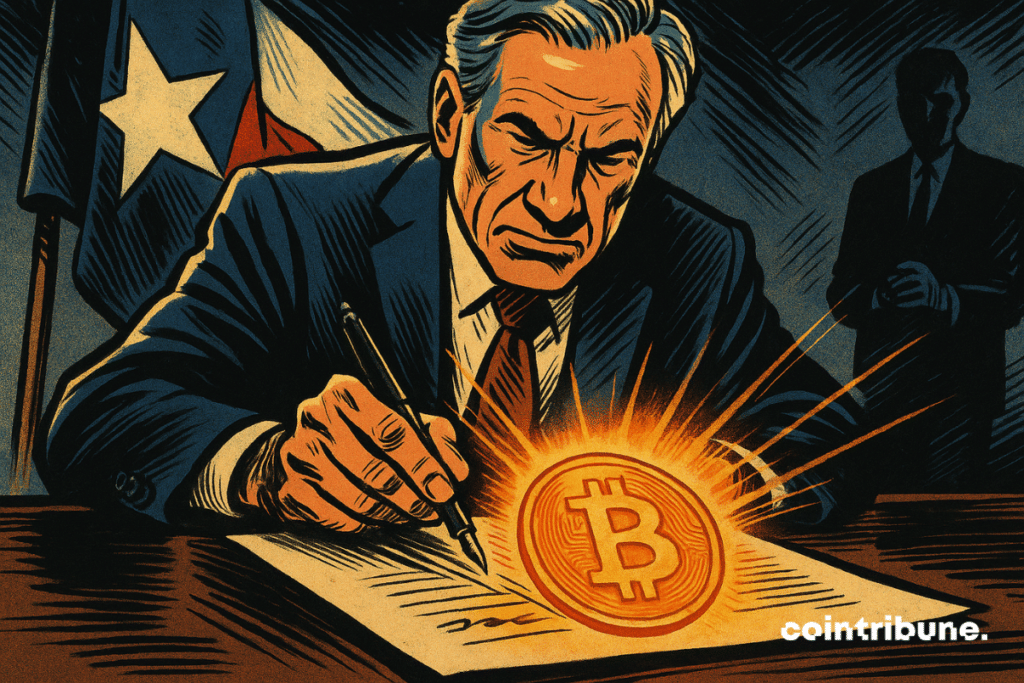13h05 ▪
4
min read ▪ by
While bitcoin still divides institutions, Texas takes everyone by surprise. The state adopts a public Bitcoin reserve. This decision loudly asserts its ambition to play a central role in the digital economy of tomorrow. An initiative that shakes up the traditional rules of public finance management and could set a precedent.

In Brief
Texas adopts a strategic Bitcoin reserve funded by public funds.
The fund will be managed independently of the Treasury by the State Comptroller.
Goal: secure digital assets against future economic instability.
A Bold Decision in the Digital Asset Landscape
Texas has just made history in crypto by embedding bitcoin at the very heart of its financial strategy. Last Saturday, Governor Greg Abbott signed bill SB 21, formalizing the creation of a strategic BTC reserve. This move is not merely a publicity stunt: it positions the state in an economic anticipation stance, midway between futuristic vision and preservation instinct.
Unlike previous attempts seen in Arizona or New Hampshire, Texas takes the logic further. Here, the fund is autonomous, public, and… completely detached from the State Treasury. A first. Managed by Glenn Hegar, public accounts controller, this fund could soon hold several tens of millions of dollars in Bitcoin. An allocation both cautious and symbolic, orchestrated with rigorous investment criteria.
Senator Charles Schwertner, initiator of the bill, sums up the Texan mindset: if the state can invest in gold or land, why not the best-performing asset of the last decade? This pragmatic and bold vision contrasts with the regulatory inertia of many other U.S. states.
Bitcoin as an Economic Shield?
Beyond the simple political move, the project hints at a deeper transformation: bitcoin becomes an instrument of state sovereignty. By bypassing the public Treasury and safeguarding the reserve via law HB 4488, Texas equips itself to build an independent monetary striking force.
This bill explicitly protects funds, including bitcoins, from any unexpected budgetary withdrawals. And this, even if no satoshi has yet been purchased. The message is clear: this is not a short-lived experiment but a long-term strategy designed to endure, even without immediate market commitment.
Lee Bratcher, president of the Texas Blockchain Council, foresees initial investments in the range of tens of millions of dollars. A relatively modest sum at the scale of a state like Texas, but enough to lay the groundwork for an alternative monetary policy.
Behind this initiative lies a vision: that of a state capable of freeing itself from classic monetary rules to explore new forms of stability.
A Reserve with Geopolitical Implications
This Texan shift could set a precedent. By injecting bitcoin into its reserve strategy, Texas redefines the contours of economic security. At a time when inflation erodes fiat currency value and distrust toward financial institutions grows, anchoring part of the reserves in a decentralized asset is almost an act of institutional dissent.
But beware: the operation is not without risks. Bitcoin’s legendary volatility could weaken the fund’s financial balance if not controlled. That is why the project relies on rigorous investment standards, entrusted exclusively to professionals. There is no question here of playing trader with public money.
The Texan move also raises political questions. That a state chooses to sanctify bitcoin within its legislation, without even promoting it in its official communications, says a lot. It is a fundamental strategy, a discreet, almost silent anticipation, but potentially disruptive for the American federal model.
With this strategic reserve, Texas is not just buying bitcoin. It is buying time, independence, and maybe a different future, despite Europe’s lead on regulation.
Maximize your Cointribune experience with our “Read to Earn” program! For every article you read, earn points and access exclusive rewards. Sign up now and start earning benefits.


Fascinated by Bitcoin since 2017, Evariste has continuously researched the subject. While his initial interest was in trading, he now actively seeks to understand all advances centered on cryptocurrencies. As an editor, he strives to consistently deliver high-quality work that reflects the state of the sector as a whole.
DISCLAIMER
The views, thoughts, and opinions expressed in this article belong solely to the author, and should not be taken as investment advice. Do your own research before taking any investment decisions.




